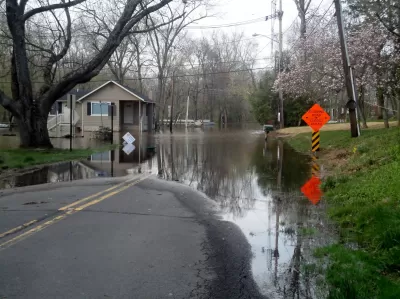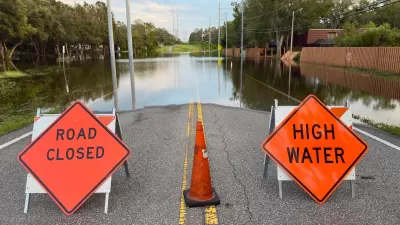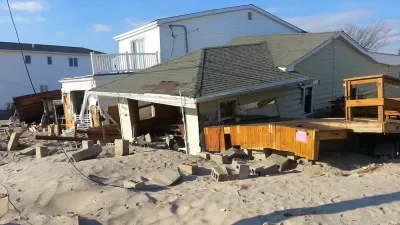As the threat of flooding increases, buyout programs to relocate homeowners are a better alternative to rebuilding—for cities and residents.

John Schwartz reports on buyout programs that pay homeowners to move out of flood-prone areas. Cities can then level homes and turn the land into open space and green infrastructure to help mitigate future flooding impacts.
It is a more cost-effective strategy than rebuilding. "The costs of flooding continue to climb, but only 20 percent of the money that the Federal Emergency Management Agency distributes in disaster grants is earmarked for pre-disaster work, even though research shows that a dollar spent on mitigation before a disaster strikes results in at least six dollars in savings," writes Schwartz.
Over 20 years ago, Nashville started buying homes in hazardous areas, and the city's successful program is a model for planning ahead of flooding disasters. Many residents welcome the option to relocate, but cities executing buyout programs still face an uphill battle with long-term residents or when the financial benefits might not be substantial enough.
"Nicholas Pinter, the associate director of the center for watershed sciences at the University of California, Davis, said the challenges to 'overcoming social inertia' are so high because of 'the intense sense of place that people have,'" notes Schwartz.
FULL STORY: As Floods Keep Coming, Cities Pay Residents to Move

Trump Administration Could Effectively End Housing Voucher Program
Federal officials are eyeing major cuts to the Section 8 program that helps millions of low-income households pay rent.

Planetizen Federal Action Tracker
A weekly monitor of how Trump’s orders and actions are impacting planners and planning in America.

Ken Jennings Launches Transit Web Series
The Jeopardy champ wants you to ride public transit.

Rebuilding Smarter: How LA County Is Guiding Fire-Ravaged Communities Toward Resilience
Los Angeles County is leading a coordinated effort to help fire-impacted communities rebuild with resilience by providing recovery resources, promoting fire-wise design, and aligning reconstruction with broader sustainability and climate goals.

When Borders Blur: Regional Collaboration in Action
As regional challenges outgrow city boundaries, “When Borders Blur” explores how cross-jurisdictional collaboration can drive smarter, more resilient urban planning, sharing real-world lessons from thriving partnerships across North America.

Philadelphia Is Expanding its Network of Roundabouts
Roundabouts are widely shown to decrease traffic speed, reduce congestion, and improve efficiency.
Urban Design for Planners 1: Software Tools
This six-course series explores essential urban design concepts using open source software and equips planners with the tools they need to participate fully in the urban design process.
Planning for Universal Design
Learn the tools for implementing Universal Design in planning regulations.
Ada County Highway District
Clanton & Associates, Inc.
Jessamine County Fiscal Court
Institute for Housing and Urban Development Studies (IHS)
City of Grandview
Harvard GSD Executive Education
Toledo-Lucas County Plan Commissions
Salt Lake City
NYU Wagner Graduate School of Public Service





























